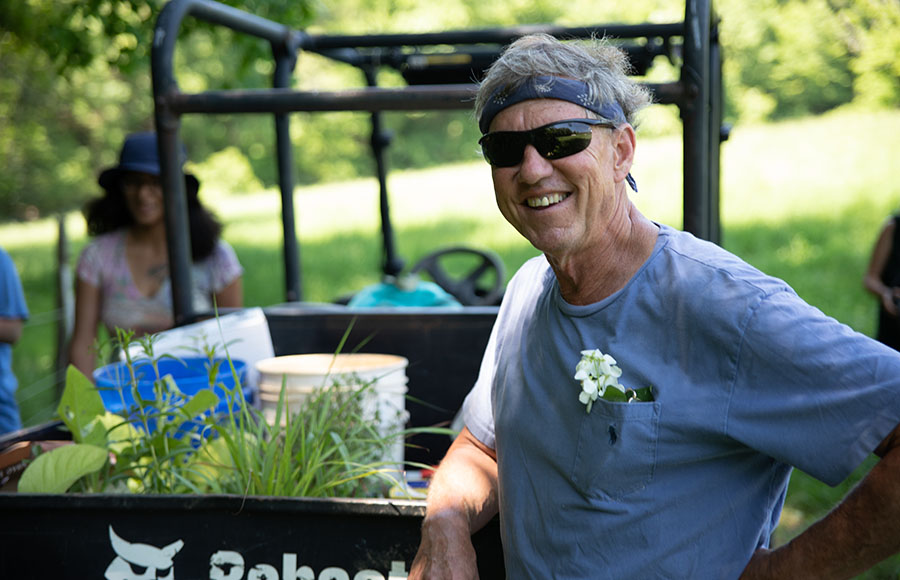BOONE, N.C. — In May, C.C. “Chip” Hope III was hired as the Goodnight Family Department of Sustainable Development’s Teaching and Research Farm director. The farm is located at Appalachian State University’s Blackburn Vannoy property in Ashe County and is used as a teaching and research facility for students and faculty.
Hope joins Assistant Farm Manager Todd Rudicill as a full-time resident of the farm, and will oversee day-to-day operations and teach courses at Appalachian in addition to developing and implementing a long-term strategy for the farm.
Hope is no stranger to the department or to the farm: He's taught summer courses as an adjunct faculty member in the sustainable development department at Appalachian for the past five years, and his familiarity with this unique university resource has helped him build a vision to realize the farm’s potential, he said.
“We have a beautiful property, a great staff and enthusiastic students,” he shared. “I’ve been here full time since mid-May, and every week, I talk with people both on campus and in the community looking for ways to use the farm. I want to make it a greater resource for the university and beyond.”
Some of Hope’s plans include monthly homesteading workshops showcasing skills like canning, medicine-making and wood-fired cooking; growing the partnership with Appalachian’s Food Services that Rudicill established in spring 2018 to sell farm produce to campus entities; building a solar greenhouse and nursery complex; rejuvenating the farm’s orchard; and installing new chicken houses.
He’s also implementing the Seeds of Resilience project, which is a garden designed to grow historically accurate crops such as Virginia smoking tobacco, Bradford okra, Carolina black peanut, Cherokee purple tomatoes, winter squash and more. Seeds from these crops will be provided to both the Watauga and Ashe County Seed libraries.
As a trained horticulturist, Hope has the necessary skills to oversee the farm. He earned an Associate of Applied Science in horticulture technology from Central Piedmont Community College in 1981 and an M.S. in plant and environmental science from Clemson University in 2001. In addition to owning and managing his own family farm, he built a sustainable agriculture program at Western Piedmont Community College (WPCC). It was here he met Rudicill, who was one of his students before becoming a WPCC employee.
The two worked together for years before Rudicill joined Appalachian in spring 2016, and when a full-time director position opened, Hope jumped at the opportunity to grow Appalachian’s farm with Rudicill.
“Even though leaving Western Piedmont was the hardest decision I’ve made, I saw an opportunity to be part of something new and challenging at Appalachian,” he said. “It was too exciting to turn down — this is where I need to be.”
Hope said his No. 1 priority is to provide students with a top-notch education and ensure they understand all the moving parts that come with managing a working farm. He’s a firm believer in teaching a strong work ethic along with the hands-on skills, he said.
“With the changing climate, it’s more challenging than ever to be a farmer now,” he said. “Students don’t always realize the diversity of skills you need on a farm, and how things change from day to day. You must learn to be flexible and look for solutions.”
Most of all, Hope and Rudicill said they want the farm to be a resource for everyone — they want to give students the true farming experience, to provide the public with an event venue and educational workshops, and for the university community to utilize the space for classes, retreats and more.
“We want to provide great learning opportunities for everyone — students and community alike,” he shared. “Ideally, we’ll see tours and groups coming out regularly.”
About the Goodnight Family Department of Sustainable Development
One of seven departments housed in the College of Fine and Applied Arts, the Goodnight Family Department of Sustainable Development at Appalachian State University prepares students to thoughtfully analyze human development while focusing on the applied practice of pursuing transformative, community-driven development and social change. It offers a Bachelor of Science degree in sustainable development with concentrations in agroecology and sustainable agriculture; community, regional and global development; and environmental studies; as well as a Bachelor of Arts and minor in sustainable development. Learn more at https://sd.appstate.edu.
About Appalachian State University
As a premier public institution, Appalachian State University prepares students to lead purposeful lives. App State is one of 17 campuses in the University of North Carolina System, with a national reputation for innovative teaching and opening access to a high-quality, cost-effective education. The university enrolls more than 21,000 students, has a low student-to-faculty ratio and offers more than 150 undergraduate and 80 graduate majors at its Boone and Hickory campuses and through App State Online. Learn more at https://www.appstate.edu.
What do you think?
Share your feedback on this story.


![How NCInnovation Is Rethinking Economic Development in North Carolina [faculty featured]](/_images/_posts/2026/02/rethinking-economic-development-600x400.jpg)









